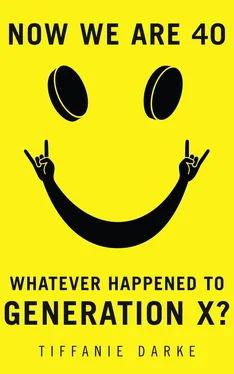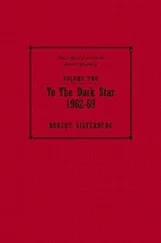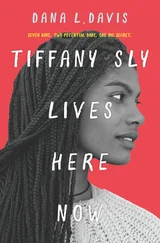And just as importantly, how are we going to cope with life from here on in? What’s it going to look like for us post menopause (Christ!) or when we qualify for our free bus pass? The world is in disruption – our liberalism is under attack on both sides of the Atlantic, the model for everything from fashion to news is breaking down, Christianity is in rapid decline, extremism is on the up, whole populations are on the move, happiness levels are at their lowest ever recorded – how will we emerge?
What I do know is that I will still be working to pay off my mortgage (at least I have one), with no pension to support me in my beach habit (it won’t be golf). Sometimes I put on a miniskirt and (a lot of) make-up and I can go to a club where no one can see very well and I can party all night – but then it takes me a week to recover. I know the hippest place in London to order a slider and I can name Beyoncé’s last single and the first one to leave One Direction (Zayn, my friends). I am on Snapchat (don’t use it) and still collect rare trainers, but the truth is I am also a knackered mum who gets her kicks from surfing the specials on Ocado and shouting at the neighbours to keep the noise down.
Occasionally I’ll book a weekend away, but I’ll look forward to it not for the sex, but the sleep. I still go to Ibiza but these days it’s the yoga teacher’s number I have on Favourites. I have Mary Beard and Madonna’s unauthorised biography on my bedside table. (Mary Beard is filed under Sheryl Sandberg. Madonna’s biog is well thumbed.) I have even begun to order soup for starters.
I live life in between young and old. I am neither Boomer nor Millennial. I am still an absolutely cynical witch who likes to do naughty things and wants to burn down the establishment – except, I am the establishment now. From government ministers to CEOs, the family GP to my kids’ headmistress – they are all my age. Once the rulebreakers, now we are the rulemakers. Like a zombie, I teach my kids to be good and recite their times tables and respect their teachers and work hard so they can go to university and get a good job. For what? – as I might have asked 25 years ago.
So are we just a bunch of directionless cynics who have now hit middle age and feel a bit sad and conformist? Do we know what we’re doing next, or are we not sure, as all the exciting stuff seems to have migrated to either side of us? How have we retained our rulebreaking and innovation, how have we changed the world and how are going to go on changing it? Did we free ourselves from the daily grind as we always hoped we would, or just create a new cage to live in? And do appearances – the threads, the ’do, the language, the who, the what and the where – really still matter?
Here’s my evidence. You decide.*
* Rule Number 1 of a features journalist: it takes three examples to make a trend. And once you’ve got a trend, you’ve got a feature. Features journalism is based entirely on subjectivity and three randomly encountered examples. For the purposes of this book I have interviewed slightly more than three people, but I am claiming equal subjectivity – mine, and theirs. Any time you get distracted, just turn to the Appendix where you can learn fun things about the handful of people I talked to. It’s nice, easy reading – what we features journalists would call a ‘sidebar’.
1
I Was Eight in the Eighties
I was eight when the Eighties began. Too young to live them, but old enough to be knocked around by what was going on. I got my info from John Craven on Newsround , Bruce Parker on South Today and Smash Hits magazine. I remember the Falklands War and the sinking of the Belgrano , probably around the time Wham! entered my orbit. Of course, Thatcher was a consistent backdrop (my parents, traumatised by the economics of the Seventies and being utterly broke, were breathless for her and would not hear a word against her in the house). The miners’ strike was a thing, but it was a long way away from Bournemouth, where my dad had taken up a job as a vascular surgeon. He was a big believer in the NHS being run by passion and vocation, and the importance of public services, but Maggie’s privatisation schemes were all good – and private medical practice served my dad pretty well.
Being an adolescent in Bournemouth was actually really fun: there were beaches in the summertime and boys with boats, there was a Wimpy bar that served Knickerbocker Glories and a cinema or two (I saw Desperately Seeking Susan on my first date), and there was an ice rink where my friends would have birthday parties. We’d hang out on bikes in the park – I had a Gresham Flyer, which was denim blue. My brother’s BMX had a much comfier seat but the handlebars were a bit weird.
Then a roller disco opened and that felt pretty edgy – a daytime nightclub and sexy women skating round in miniskirts and legwarmers. One was a steward named Hayley, with long, blonde hair and a pneumatic body. She had a red pleated miniskirt like the women in Bucks Fizz wore in ‘Making Your Mind Up’ and she was the prettiest girl in the rink. Ask any boy from Bournemouth what he likes best about his hometown and he’ll tell you it’s the girls.
But mostly I remember Top of the Pops , and me and my friend Lizzie religiously learning all the words to the songs like they were lines in a play. I would record the Top 40 on Sunday night on a cassette tape so I could go through it all the next week copying the lyrics down into an exercise book – ‘Hey Mickey’ by Tony Basil, Howard Jones, the Thompson Twins. I had a picture of Wham! on my wall – my party trick then (and now) was to recite all the words to the ‘Wham Rap’. I properly fancied Andrew Ridgeley. He was my first crush. Smash Hits did a pullout centrespread of him and George that I tacked on to my Laura Ashley wallpaper. Then Mum had another baby and we got an au pair who had this really weird short haircut with a side parting and she loved the Human League. And so began my fascination with cool: something remote I didn’t quite understand but absolutely wanted to be part of.
This was a world with no internet, no mobile phones and just three TV stations. Everyone sat down together and watched Saturday Swap Shop and Tiswas , shows that would foreshadow The Big Breakfast and The Word . You couldn’t stream Dallas and Dynasty in bulk episodes, you had to wait until Saturday night, and watch them episodically week by week. They depicted Reagan’s America, an off-the-wall land of excess, where ranchers drank whisky and drilled for oil, women inhaled champagne and sported massive shoulder pads, and everyone was a total bitch to each other. The whole thing looked incredible. My parents wouldn’t let my brother and me watch either of them to begin with, but they were quite often out on a Saturday night, so we used to pour the babysitter enormous gin and tonics (my dad thought it was very important we knew how to pour a gin and tonic; it made us useful around the house) then sneak downstairs and watch them over her shoulder through the crack in the door.
The nation’s station was Radio 1: Bruno Brookes, Dave Lee Travis, Mike Reid and Simon Bates’s Our Tune. We did things together as a nation, communally, and we went places to meet each other face to face. Girlfriends would phone in the evening to chat on the phone and my dad would be furious to discover me still on the line 40 minutes later – not only was he footing the bill but he was also on-call to the hospital and there was no other way for emergency care to get hold of him. No Skype or mobiles back then.
Eventually I was allowed to take the bus into town on my own and watch the high street change around me. Bournemouth was a town that had been known as God’s Waiting Room when we arrived. It was full of retirement flats and blue rinses, but it started to thrive under Thatcher’s economy, and the average age of the population plummeted. I began to rebel against my mum’s choice of wardrobe for me – she loved all those Eighties bright colours. There was a big C&A at the top of the town that peddled this stuff, along with a Chelsea Girl, an Etam, Tammy Girl and Dorothy Perkins. The high street was not cool back then, not by a long way. It was cheap clothes in nasty fabrics with lairy designs.
Читать дальше












